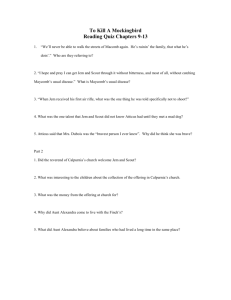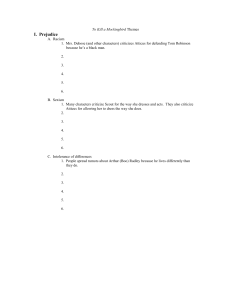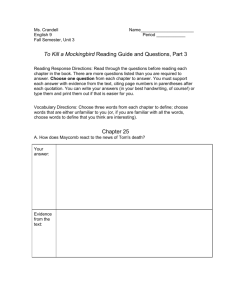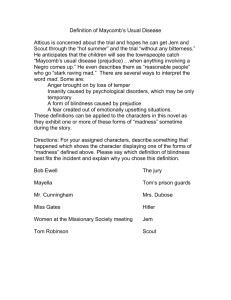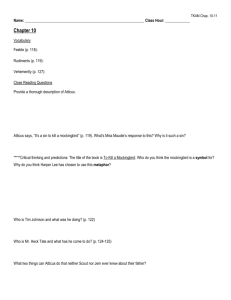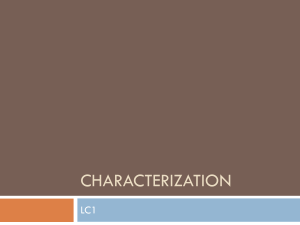ENG 2D TO KILL A MOCKINGBIRD: CHAPTERS 24
advertisement
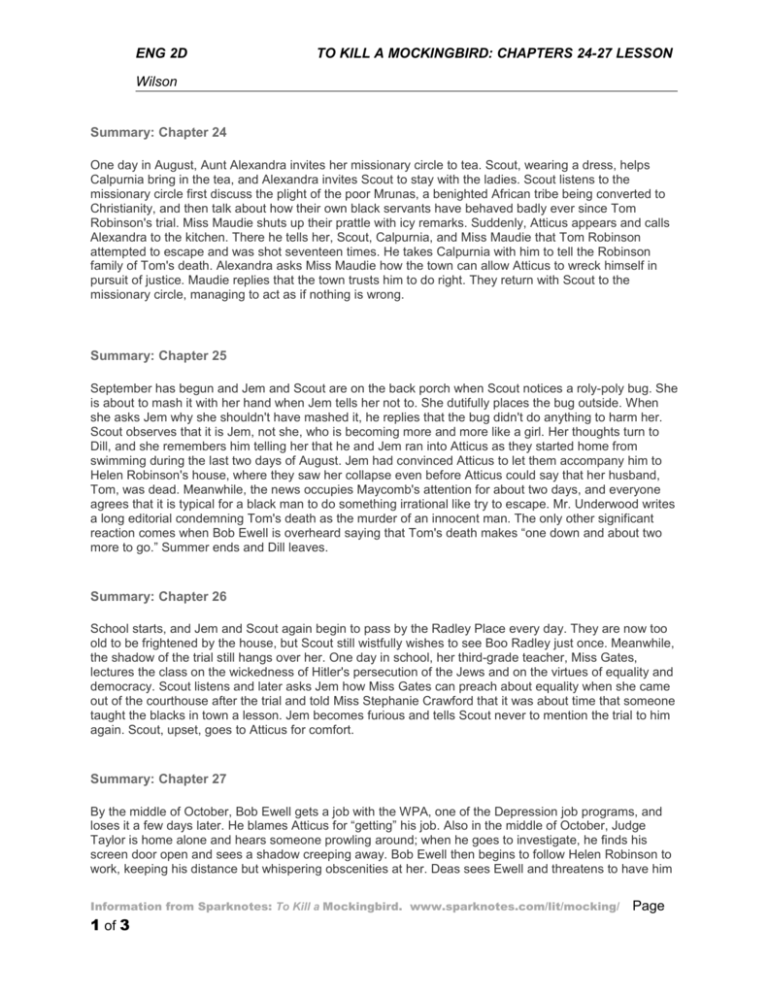
ENG 2D TO KILL A MOCKINGBIRD: CHAPTERS 24-27 LESSON Wilson Summary: Chapter 24 One day in August, Aunt Alexandra invites her missionary circle to tea. Scout, wearing a dress, helps Calpurnia bring in the tea, and Alexandra invites Scout to stay with the ladies. Scout listens to the missionary circle first discuss the plight of the poor Mrunas, a benighted African tribe being converted to Christianity, and then talk about how their own black servants have behaved badly ever since Tom Robinson's trial. Miss Maudie shuts up their prattle with icy remarks. Suddenly, Atticus appears and calls Alexandra to the kitchen. There he tells her, Scout, Calpurnia, and Miss Maudie that Tom Robinson attempted to escape and was shot seventeen times. He takes Calpurnia with him to tell the Robinson family of Tom's death. Alexandra asks Miss Maudie how the town can allow Atticus to wreck himself in pursuit of justice. Maudie replies that the town trusts him to do right. They return with Scout to the missionary circle, managing to act as if nothing is wrong. Summary: Chapter 25 September has begun and Jem and Scout are on the back porch when Scout notices a roly-poly bug. She is about to mash it with her hand when Jem tells her not to. She dutifully places the bug outside. When she asks Jem why she shouldn't have mashed it, he replies that the bug didn't do anything to harm her. Scout observes that it is Jem, not she, who is becoming more and more like a girl. Her thoughts turn to Dill, and she remembers him telling her that he and Jem ran into Atticus as they started home from swimming during the last two days of August. Jem had convinced Atticus to let them accompany him to Helen Robinson's house, where they saw her collapse even before Atticus could say that her husband, Tom, was dead. Meanwhile, the news occupies Maycomb's attention for about two days, and everyone agrees that it is typical for a black man to do something irrational like try to escape. Mr. Underwood writes a long editorial condemning Tom's death as the murder of an innocent man. The only other significant reaction comes when Bob Ewell is overheard saying that Tom's death makes “one down and about two more to go.” Summer ends and Dill leaves. Summary: Chapter 26 School starts, and Jem and Scout again begin to pass by the Radley Place every day. They are now too old to be frightened by the house, but Scout still wistfully wishes to see Boo Radley just once. Meanwhile, the shadow of the trial still hangs over her. One day in school, her third-grade teacher, Miss Gates, lectures the class on the wickedness of Hitler's persecution of the Jews and on the virtues of equality and democracy. Scout listens and later asks Jem how Miss Gates can preach about equality when she came out of the courthouse after the trial and told Miss Stephanie Crawford that it was about time that someone taught the blacks in town a lesson. Jem becomes furious and tells Scout never to mention the trial to him again. Scout, upset, goes to Atticus for comfort. Summary: Chapter 27 By the middle of October, Bob Ewell gets a job with the WPA, one of the Depression job programs, and loses it a few days later. He blames Atticus for “getting” his job. Also in the middle of October, Judge Taylor is home alone and hears someone prowling around; when he goes to investigate, he finds his screen door open and sees a shadow creeping away. Bob Ewell then begins to follow Helen Robinson to work, keeping his distance but whispering obscenities at her. Deas sees Ewell and threatens to have him Information from Sparknotes: To Kill a Mockingbird. www.sparknotes.com/lit/mocking/ 1 of 3 Page ENG 2D TO KILL A MOCKINGBIRD: CHAPTERS 24-27 LESSON Wilson arrested if he doesn't leave Helen alone; he gives her no further trouble. But these events worry Aunt Alexandra, who points out that Ewell seems to have a grudge against everyone connected with the case. That Halloween, the town sponsors a party and play at the school. This plan constitutes an attempt to avoid the unsupervised mischief of the previous Halloween, when someone burglarized the house of two elderly sisters and hid all of their furniture in their basement. The play is an “agricultural pageant” in which every child portrays a food: Scout wears a wire mesh shaped to look like ham. Both Atticus and Aunt Alexandra are too tired to attend the festivities, so Jem takes Scout to the school. ANALYSIS OF CHAPTERS 24-27 When he reassures his family that Bob Ewell does not really intend to harm him, Atticus advises Jem to stand in Bob Ewell's shoes, echoing the advice that he gives Scout earlier in the novel and evoking one of the most important moral themes in the book. Here, however, Atticus's attempt to understand another human falls short: he makes an honest mistake in his analysis by failing to understand the depth of Ewell's anger toward him. Aunt Alexandra is more insightful, maintaining that a man like Ewell will do anything to get revenge. Although her comments seem typical of her tendency to stereotype “those people” who are different from the Finches, her analysis of Ewell proves correct. For all her faults, Aunt Alexandra gains, by way of her stereotypes, a basically reliable understanding of the people of Maycomb. Both Jem and Scout are forced to face the adult world in these chapters to an unprecedented degree. In fact, Jem is actually beginning to enter the adult world, showing Scout his chest hair and contemplating trying out for football. Jem and Atticus discuss the judicial system in Maycomb County for much of Chapter 23. Their conversation is an education for Jem in the realities not only of the jury system but also of life. Atticus's revelation that the Cunningham on the jury wanted to acquit Tom presents Jem with a remarkable instance of an uneducated white man being able to see beyond his ingrained racial prejudice—a further indication that the adult world is complex rather than black and white, as is the world of children. Scout, meanwhile, moves closer to the adult world by drawing closer to Alexandra. Alexandra's refusal to have the lowly Walter Cunningham to dinner puts her at odds with Jem and Scout, providing them with another opportunity to deride Maycomb's ludicrously irrational social hierarchy. But the missionary tea party reveals Alexandra's better side. The scene brilliantly portrays the hypocrisy of the Maycomb ladies. “Mrs. Merriweather's large brown eyes always filled up with tears when she considered the oppressed [in Africa],” Scout notes, yet the same woman can complain that “there's nothing more distracting than a sulky darky.” In the wake of hearing of Tom Robinson's tragic death, however, the tea party becomes an opportunity for the Finch women to display moral courage by maintaining a public facade of composure. Mr. Underwood likens Tom's death to “the senseless slaughter of songbirds,” an obvious reference to the novel's title. In this moment, Alexandra and Scout stand together as finches, as harmless as mockingbirds, forced to bear the white community's utter disregard of justice. Whereas Jem embraces entrance into the adult world, Scout seems reluctant about it. Jem proudly shows Scout his chest hair as a mark of his emergence into manhood. Scout's badge of incipient womanhood, the dress that she wears to the missionary circle meeting, doesn't suit her; she wears her usual tomboy trousers underneath. Additionally, whereas Jem intently discusses aspects of the complicated legal system with Atticus, Miss Stephanie teases the young Scout about growing up to be a lawyer. This difference in maturity between Jem and Scout manifests itself in the incident with the roly-poly bug. Wishing to withdraw back into the childhood world of actions Information from Sparknotes: To Kill a Mockingbird. www.sparknotes.com/lit/mocking/ 2 of 3 Page ENG 2D TO KILL A MOCKINGBIRD: CHAPTERS 24-27 LESSON Wilson without abstract significance, Scout moves to crush the bug. Jem, now sensitive to the vulnerability of those who are oppressed, urges her to leave the defenseless bug alone. These short chapters are marked by a mood of mounting mischief laced with a growing sense of real danger. They begin with a reference to the Radley Place, the source of childhood terror that no longer scares Jem and Scout —“Boo Radley was the least of our fears,” Scout comments. The dissipation of Jem and Scout's youthful fear of Boo reflects how the trial has hardened them and how, in the wake of the trial's injustice and Bob Ewell's threats, the children have become increasingly mired in the more serious concerns of the adult world. The Radley Place is part of the past now. The aura of scariness attached to the name “Boo” has dissolved into curiosity, perhaps even into fondness. As Jem and Scout gain a greater understanding of Boo, he seems less like a town freak to them and more, in a strange way, like a pet or a plaything. Scout still expresses a wish to see Boo someday, and she remembers fondly the near encounters with Boo during summers past. These memories restore Boo Radley to the reader's consciousness, which has been occupied with the trial for most of Part Two, thereby foreshadowing Boo's appearance a few chapters later. Meanwhile, the aftereffects of the trial continue to loom, and Jem and Scout's fading fear of Boo accentuates the real danger that Bob Ewell's various attempts at revenge present. Bob Ewell shows himself to be sinister, and the fact that he has not yet attempted anything against the Finches only increases the sense of foreboding. Atticus remains confident in his own safety, but this confidence begins to seem like wishful thinking. In fact, rather than offer further thematic commentary, Lee devotes a great part of these chapters to building tension and suspense by focusing on the unpredictable threat that Bob Ewell poses. The misdeeds of the previous Halloween, which lead to the idea of a Halloween play this year, hint again at the damage caused by those who act without conscience. Meanwhile, the incident involving Miss Gates reveals the extent to which Jem remains affected by the trial. Despite the grim experience of the trial, Scout retains her faith in the basic goodness of others, and thus her teacher's obvious hypocrisy confuses her. Jem, meanwhile, has become disillusioned, and when Scout tries to talk to him about Miss Gates, he shuts himself off from the painful memory of the trial. Bob Ewell's threats are not the only dark cloud hanging over the Finch household in this section: the injustice of the trial has changed Jem irrevocably. Information from Sparknotes: To Kill a Mockingbird. www.sparknotes.com/lit/mocking/ 3 of 3 Page
